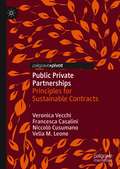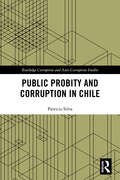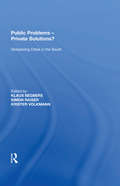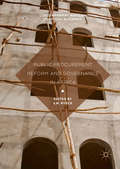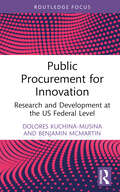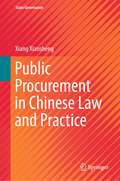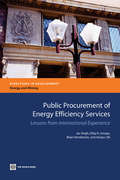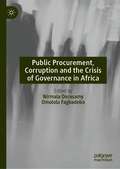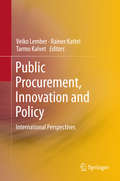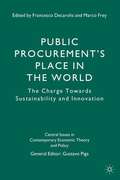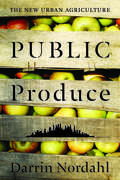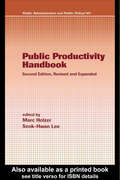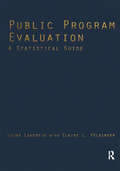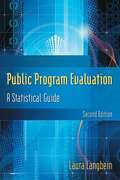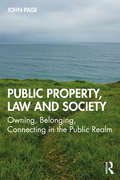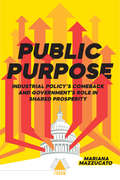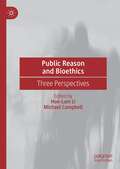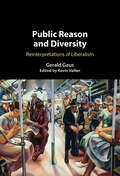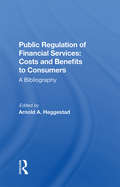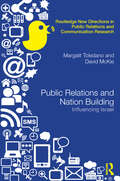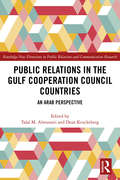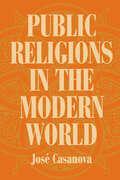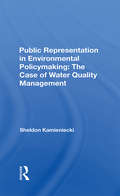- Table View
- List View
Public Private Partnerships: Principles for Sustainable Contracts
by Veronica Vecchi Francesca Casalini Niccolò Cusumano Velia M. LeoneBy merging public and private tangible and intangible capitals, Public Private Partnerships contracts (PPP) are fundamental to generate public value and to support economic and social development; in the aftermath of Covid-19 pandemic, they prove critical to pave the way for the recovery. This book is intended to support the co-evolution of the main public and private players involved in PPP contracts for infrastructure and service delivery, by providing principles, based on the academic and professional experience of the authors, that can be applied across sectors and jurisdictions. Drawing on the framework of public-private collaborations at macro, meso and micro level, this book provides a practical perspective on the most relevant legal, financial and contractual issues of PPP contracts for infrastructure and service delivery.
Public Probity and Corruption in Chile (Routledge Corruption and Anti-Corruption Studies)
by Patricio SilvaIn most Latin American countries, key officials and political figures have been involved in big corruption scandals in the last decade, leading to a rigorous academic debate on the possible socio-economic, political and cultural factors responsible for corrupt practices across the region. This book takes a different approach by focusing on Chile, which shows the lowest levels of corruption in the region. Instead of analysing notoriously bad cases in Mexico, Argentina, Brazil and Venezuela, this book explores the factors which have led to a relatively high degree of public probity among power holders in Chile. Public Probity and Corruption in Chile presents a long-term historical analysis demonstrating that public probity in Chile has its roots in the colonial period, and that public and state responses have historically shown a low level of tolerance for public cases of corruption. In particular, the author highlights the role played by relative poverty and lack of resources, geographical remoteness, the impact of the Arauco War against the Mapuche people, the militarisation of both government and public administration, the extreme oligarchic nature of the Chilean aristocracy, the early consolidation of state institutions and the rule of law, high levels of political stability and the role played by patriotism. Studying an example of better practice in detail in this way provides valuable insights into the factors and actors which can help to prevent or to revert the phenomenon of public corruption in the region more generally. As such, this book will be of interest to researchers of corruption and public probity both in Chile and further afield.
Public Problems - Private Solutions?: Globalizing Cities in the South
by Simon RaiserCities and city regions are undergoing rapid transformation. They are prime locations of innovation, while at the same time facing growing problems of spatial fragmentation and social exclusion. By addressing these problems, cities become forerunners for new patterns of governance, which include increasingly private actors. While research on 'global' cities has focused primarily on the world's leading financial and economic centres, comparative research on the changing role of large, complex cities in the developing world is less advanced. But it is here, where public problems are most seriously threatening the cohesion of urban society and where the need for new answers is most urgent. Illustrated by in-depth examinations of four city regions: Shanghai, Mumbai, Johannesburg and São Paulo, this book readdresses this balance. The book revisits the same set of cities from different angles, thereby reflecting urban contradictions, juxtapositions, and disjunctures.
Public Procurement Reform and Governance in Africa
by S. N. NyeckThis book presents an interdisciplinary exploration of the governance of public procurement reform in Africa. Through a bottom-up approach to case studies and comparative analyses, scholars, practitioners, and social activists write about the organizational mechanisms and implementation gaps in public procurement governance in light of the general premises of national reform. Reforming the ways in which government purchases works, goods, and services from the private sector is one of the most sweeping policy reform undertaken in Africa in the past decade. Despite the transnational scope of policy change, very little is known about the mechanisms of public procurement governance at the subnational level. The argument in this volume is that policy reforms that mitigate contractual hazards along the three-dimensional "law-politics-business matrix" are more likely to bring about meaningful institutional transformation and broader social accountability. Key to substantive transformation of public procurement is the revitalization and professionalization of the public sector to meet the opportunities and challenges of development by contract.
Public Procurement Regulation in Africa
by Sue Arrowsmith Geo QuinotPublic procurement regulation in Africa is not widely researched. To address the shortage of scholarship in this area and to promote future research, this book analyses the law governing public procurement in a number of African systems and looks at key themes relevant to all African states. Part I discusses the regulatory regimes of nine African systems using a common framework, providing both a focused view of these African systems and an accessible comparative perspective. In Part II, key regulatory issues in public procurement that are particularly relevant in the African context are assessed through a comparative approach. The chapters consider the influence of international regulatory regimes (particularly the UNCITRAL Model Law on procurement) on African systems and provide insights into the way public procurement regulation is approached in Africa.
Public Procurement for Innovation: Research and Development at the US Federal Level (Routledge Research in Public Administration and Public Policy)
by Dolores Kuchina-Musina Benjamin McMartinIn this book, nationally recognized public procurement experts Dolores Kuchina-Musina and Benjamin McMartin present a comprehensive analysis of the alternative contract vehicles used to promote innovation in the United States (US). Kuchina-Musina and McMartin begin by introducing the innovation policy environment in the US, addressing current trends in the workforce, decreased investment in research and development (R&D), and how technology is increasing at a rapid speed. They then go on to discuss key terms and subjects to show how public procurement and innovation policy are tied together. Diving deeper, Kuchina-Musina and McMartin examine the pathways the federal government uses such as the Federal Acquisition Regulations (FAR) part 12 acquisition, a review of the Small Business Innovation Research (SBIR) and Small Business Technology Transfer (STTR) programs, and non-FAR-based contract overview with a specific focus on Other Transaction Authorities (OTA). Using the new Department of Defense (DoD) prototype OTA that was enacted in November 2015, Kuchina-Musina and McMartin conclude by presenting a methodology for examining the effectiveness of OTs. Specifically, they show the way the government is evaluating the DoD statute and discussions on some of the additional guidance the DoD uses to implement this authority. Bringing academic literature on innovation policy and applying it to the practitioner environment, Public Procurement for Innovation provide its audience an understanding of models, methods, and techniques the US uses to promote the development of innovative technologies and products. Clearly written and impeccably researched, the book fills a huge void in the literature on public procurement.
Public Procurement in Chinese Law and Practice (State Governance)
by Xiang XianshengThis book aims to present an overview of government procurement of public services in China. It introduces three types of government procurement of public service and analyzes the legal boundaries, legal subjects, purchasing methods, regulation and legal remedy system around it. At the end, the ways of improving law system are brought up for policy suggestion. It helps readers understand how procurement of public services proceeds in China.
Public Procurement of Energy Efficiency Services
by Brian Henderson Xiaoyu Shi Dilip R. Limaye Jas SinghThe current universal concerns about global energy security, competitiveness, and environmental protection make energy efficiency more important than ever. However, realizing large-scale savings has proven a significant challenge due to many barriers. 'Public Procurement of Energy Efficiency Services' looks at a largely untapped energy efficiency market - the public sector. While the efficiency potential in this sector is substantial, the implementation of energy savings programs has been complicated by a number of factors, such as insufficient incentives to lower energy costs, rigid budgeting and procurement procedures, and limited access to financing. The book looks at energy savings performance contracts (ESPCs) as a means of overcoming some of these barriers. Because public facilities can outsource the full project cycle to a commercial service provider, ESPCs can enable public agencies to solicit technical solutions, mobilize commercial financing, and assign performance risk to third parties, allowing the agency to pay from a project's actual energy savings. The recommendations in this book stem from case studies that identified approaches, models, and specific solutions to ESPC procurement, including budgeting, energy audits, and bid evaluation. Such an approach also offers enormous potential to bundle, finance, and implement energy efficiency projects on a larger scale in the public sector, which can yield further economies of scale. ESPCs can also serve as an attractive element for fiscal stimulus packages and efforts by governments to 'green' their infrastructure, which can create local jobs, reduce future operating costs, and mitigate their carbon footprint. Lower energy bills, in turn, help to create fiscal space in future years to meet other critical investment priorities. Bundled public sector energy efficiency projects can help stimulate local markets for energy efficiency goods and services and 'lead by example', demonstrating good practices and providing models to the private sector.
Public Procurement, Corruption and the Crisis of Governance in Africa
by Omololu Fagbadebo Nirmala DorasamyThis book establishes a nexus between corruption in public procurement and the prevailing crisis of governance in Africa. The African continent is characterised by the growing concern for the deteriorating human security. In the midst of these woes, African political leaders are known for their stupendous wealth and riches through expropriation of national resources for personal benefits. This growing inequality in the continent has become a major driver for a series of violent and criminal activities, which have added to the worsening governance crisis. Thus, the abuse of public power for advancing private gain constitutes an impediment to effective public service delivery, thereby engendering a crisis of governance. The consequence of this is not limited to the socio-economic growth and welfare of citizens, but it often also jeopardizes the democratic credentials and objectives of the state.
Public Procurement, Innovation and Policy
by Veiko Lember Rainer Kattel Tarmo KalvetThis book maps the latest developments in public procurement of innovation policy in various contexts and analyzes the evolution and development of the various policy solutions in broader institutional contexts. In doing so, it addresses significant theoretical and practical gaps: On the one hand, there is an emerging interest in public procurement as a policy tool for spurring innovation; yet on the other hand, the current theory, with some notable exceptions, is guided and often constrained by historical applications, above all in the defence industries. By carefully examining the cases of eleven countries, the book points to the existence of much more nuanced public procurement on the innovation policy landscape than has been acknowledged in the academic and policy debates to date.
Public Procurement’s Place In The World
by Francesco Decarolis Marco FreyThis volume addresses different issues related to green innovation procurement as well as exploring the challenges involved in public procurement. It offers a broad array of perspectives, addressing both general, abstract problems of optimal public procurement and concrete cases of national or even local public procurement systems.
Public Produce: The New Urban Agriculture
by Darrin NordahlPublic Produce makes a uniquely contemporary case not for central government intervention, but for local government involvement in shaping food policy. In what Darrin Nordahl calls "municipal agriculture," elected officials, municipal planners, local policymakers, and public space designers are turning to the abundance of land under public control (parks, plazas, streets, city squares, parking lots, as well as the grounds around libraries, schools, government offices, and even jails) to grow food. Public agencies at one time were at best indifferent about, or at worst dismissive of, food production in the city. Today, public officials recognize that food insecurity is affecting everyone, not just the inner-city poor, and that policies seeking to restructure the production and distribution of food to the tens of millions of people living in cities have immediate benefits to community-wide health and prosperity. This book profiles urban food growing efforts, illustrating that there is both a need and a desire to supplement our existing food production methods outside the city with opportunities inside the city. Each of these efforts works in concert to make fresh produce more available to the public. But each does more too: reinforcing a sense of place and building community; nourishing the needy and providing economic assistance to entrepreneurs; promoting food literacy and good health; and allowing for "serendipitous sustenance." There is much to be gained, Nordahl writes, in adding a bit of agrarianism into our urbanism.
Public Productivity Handbook (Public Administration and Public Policy)
by Hwan LeeAnyone hoping to improve teamwork, performance, and budgeting, training, and evaluation programs in their organization should look no further. Completely revised, Public Productivity Handbook, Second Edition defines the role of leadership, dimensions of employee commitment, and multiple employee-organization based relationships for effective internal and external connections. It's coverage of new and systematic management approaches and well-defined measurement systems provides guidance on correct utilization of human resources that ensure improvements in productivity and performance. The authors discuss such topics as citizen-driven government and performance, public sector values and productivity, privatization, and productivity barriers in the public sector.
Public Program Evaluation: A Statistical Guide
by Laura LangbeinFirst Published in 2007. Routledge is an imprint of Taylor & Francis, an Informa company.
Public Program Evaluation: A Statistical Guide
by Laura LangbeinThis readable and comprehensive text is designed to equip students and practitioners with the statistical skills needed to meet government standards regarding public program evaluation. Even those with little statistical training will find the explanations clear, with many illustrative examples, case studies, and applications. Far more than a cookbook of statistical techniques, the book begins with chapters on the overall context for successful program evaluations, and carefully explains statistical methods--and threats to internal and statistical validity--that correspond to each evaluation design. Laura Langbein then presents a variety of methods for program analysis, and advise readers on how to select the mix of methods most appropriate for the issues they deal with-- always balancing methodology with the need for generality, the size of the evaluator's budget, the availability of data, and the need for quick results.
Public Property, Law and Society: Owning, Belonging, Connecting in the Public Realm
by John PageThis book examines the almost entirely neglected realm of public property, identifying and describing a number of key organizing principles around which a nascent jurisprudence of public property may be developed. In property law terms, the public realm is lost to plain view. Despite the vast acreage of public lands, or the extensive tracts of private lands over which public rights subsist, there is little commensurate scholarly discussion of the ideas, theories, practices, and laws of public property. This is no accident. Public property has been marginalized and pushed to the periphery for centuries, a consequence of the dominant discourse of private property, and its enclosing, encroaching tendencies. This book explores the rich diversity of the public estate, of what the public realm means for us, the general public, canvassing what we may ‘own’, where we may ‘belong’, or not, and how we may ‘connect’ through a shared use and enjoyment of public place and space. To better understand public property is to better value its critical public-wealth. Whether overlooked, over-used, or under threat of imminent loss, this book maintains that our loved (and not so loved) public spaces are essential components of our diverse, functioning, and optimistically livable human geographies. As such, they demand legal protection. This important and original book will be of considerable interest to scholars and others with interests in property and land law, socio-legal studies, legal geography and urban studies.
Public Purpose: Industrial Policy's Comeback and Government's Role in Shared Prosperity (Boston Review / Forum)
by Mariana MazzucatoHow governments can spur growth and innovation to solve their greatest challenges—from green energy to national security to building resilient health systems. Known around the world for challenging mainstream economics, economist Mariana Mazzucato believes that &“the public sector can and should be a co-creator of wealth that actively steers growth to meet its goals&” (The Financial Times). In The Mission-Driven Economy, she calls on governments to create the economies we need today. Mazzucato&’s challenge leads off a debate on the revival of Industrial policy—roughly defined as deliberate government action to re(shape) the economy. Industrial policy has fallen out of favor in recent decades as economists defer to free markets to produce innovation and growth. Yet today thinkers across the political spectrum have begun expressing new interest in industrial policy as a way to address the most serious problems of our times: from national security and climate change, to the market&’s underfunding of public goods, to sluggish economic growth and labor market dysfunction. Together, contributors make a compelling case for industrial policy—what it is, and why we need it now. Addressing investment, innovation, supply chains, and growth, they offer a robust vision of a renewed industrial policy, and what it can offer the US economy in the face of climate change and a global pandemic.
Public Reason Confucianism
by Sungmoon KimRecent proposals concerning Confucian meritocratic perfectionism have justified Confucian perfectionism in terms of political meritocracy. In contrast, 'Confucian democratic perfectionism' is a form of comprehensive Confucian perfectionism that can accommodate a plurality of values in civil society. It is also fully compatible with core values of democracy such as popular sovereignty, political equality, and the right to political participation. Sungmoon Kim presents 'public reason Confucianism' as the most attractive option for contemporary East Asian societies that are historically and culturally Confucian. Public reason Confucianism is a particular style of Confucian democratic perfectionism in which comprehensive Confucianism is connected with perfectionism via a distinctive form of public reason. It calls for an active role for the democratic state in promoting a Confucian conception of the good life, at the heart of which are such core Confucian values as filial piety and ritual propriety.
Public Reason and Bioethics: Three Perspectives
by Michael Campbell Hon-Lam LiThis book explores and elaborates three theories of public reason, drawn from Rawlsian political liberalism, natural law theory, and Confucianism. Drawing together academics from these separate approaches, the volume explores how the three theories critique each other, as well as how each one brings its theoretical arsenal to bear on the urgent contemporary debate of medical assistance in dying. The volume is structured in two parts: an exploration of the three traditions, followed by an in-depth overview of the conceptual and historical background. In Part I, the three comprehensive opening chapters are supplemented by six dynamic chapters in dialogue with each other, each author responding to the other two traditions, and subsequently reflecting on the possible deficiencies of their own theories. The chapters in Part II cover a broad range of subjects, from an overview of the history of bioethics to the nature of autonomy and its status as a moral and political value. In its entirety, the volume provides a vibrant and exemplary collaborative resource to scholars interested in the role of public reason and its relevance in bioethical debate.
Public Reason and Diversity: Reinterpretations of Liberalism
by Gerald GausGerald Gaus was one of the leading liberal theorists of the late twentieth and early twenty-first centuries. He developed a pioneering defence of the liberal order based on its unique capacity to handle diversity and disagreement, and he presses the liberal tradition towards a principled openness to pluralism and diversity. This book brings together Gaus's most seminal and creative essays in a single volume for the first time. It also covers a broad span of his career, including essays published shortly before his death, and topics including reasonable pluralism, moral rights, public reason, and the redistributive state. The volume makes accessible the work of one of the most important recent liberal theorists. Many readers will find it of value, especially those in political philosophy, political science, and economics.
Public Regulation of Financial Services: Costs and Benefits to Consumers
by Arnold A. Heggestad Arnold A Heggestad Sr AnalystIn the many studies that have been conducted on the provision of financial services for consumers, regulation has emerged as one of the most important factors. The impact of regulation on financial service industries is a major focus of this comprehensive bibliography of relevant source materials in the field of regulatory economics. The bibliography includes entries from the major economics and finance journals published over the past twenty years, major law and business journals,government documents, books, and doctoral dissertations--all indexed according to subject matter--as well as abstracts of many of the papers.The product of extensive research, Heggestad's work is invaluable to university libraries, regulatory agencies, financial institutions, and financial experts, and is an efficient and essential reference tool for anyone wishing to study specific markets and the impact of financial regulation on them.
Public Relations and Nation Building: Influencing Israel (Routledge New Directions in PR & Communication Research)
by David McKie Margalit ToledanoAll public relations emerges from particular environments, but the specific conditions of Israel offer an exceptional study of the accelerators and inhibitors of professional development in the history of a nation. Documenting and analyzing the contribution of one profession to building one specific nation, this book tells the previously-untold story of Israeli public relations practitioners. It illustrates their often-unseen, often-unacknowledged and often-strategic shaping of the events, narratives and symbols of Israel over time and their promotion of Israel to the world. It links the profession’s genesis – including the role of the Diaspora and early Zionist activists – to today’s private and public sector professionals by identifying their roots in Israel’s cultural, economic, media, political, and social systems. It reveals how professional communicators and leaders nurtured and valued collectivism, high consensus, solidarity, and unity over democracy and free speech. It investigates such key underpinning concepts as Hasbara and criticizes non-democratic and sometimes unethical propaganda practices. It highlights unprecedented fundraising and lobbying campaigns that forged Israeli identity internally and internationally. In situating Israeli ideas on democracy in the context of contemporary public relations theory, Public Relations and Nation Building seeks to point ways forward for that theory, for Israel and for the public relations of many other nations.
Public Relations in the Gulf Cooperation Council Countries: An Arab Perspective (Routledge New Directions in PR & Communication Research)
by Dean Kruckeberg Talal M AlmutairiThe Arab world has engaged in public relations for thousands of years, and the public relations literature provides multiple examples extending from ancient times. However, modern public relations is much more vaguely defined. This is partly because the research surrounding public relations practice in the Middle East remains sparse, especially in the Gulf Cooperation Council (GCC) countries. <P><P>This book presents a clear picture of contemporary PR practice in this region, providing a background on the evolution of public relations in each GCC country. It shows how environmental factors (historical, cultural, socio-political, and economic) influence practice in the region. It also contributes to public relations scholarship, education, and practice worldwide by providing new perspectives to those unfamiliar with its practice in this region. <P><P>This book will benefit scholars and practitioners alike through its informed analysis of the strengths and weaknesses of practice in the GCC countries, as well as being of great benefit to the development of professional practice in the region.
Public Religions in the Modern World
by José CasanovaIn a sweeping reconsideration of the relation between religion and modernity, Jose Casanova surveys the roles that religions may play in the public sphere of modern societies. During the 1980s, religious traditions around the world, from Islamic fundamentalism to Catholic liberation theology, began making their way, often forcefully, out of the private sphere and into public life, causing the "deprivatization" of religion in contemporary life. No longer content merely to administer pastoral care to individual souls, religious institutions are challenging dominant political and social forces, raising questions about the claims of entities such as nations and markets to be "value neutral", and straining the traditional connections of private and public morality. Casanova looks at five cases from two religious traditions (Catholicism and Protestantism) in four countries (Spain, Poland, Brazil, and the United States). These cases challenge postwar—and indeed post-Enlightenment—assumptions about the role of modernity and secularization in religious movements throughout the world. This book expands our understanding of the increasingly significant role religion plays in the ongoing construction of the modern world.
Public Representation In Environmental Policymaking: The Case Of Water Quality Management
by Sheldon KamienieckiRelying on the results of a large survey research project in western New York State, the author compares the environmental planning beliefs of public officials and citizens. His major finding is that, although leaders involved in water quality planning projects and the public share similar views on environmental issues, these leaders are by far the worst predictors of citizens' views. Professor Kamieniecki's systematic probing of the determinants that make some officials more adept than others at accurate calculation of public preference uncovers imbalanced public representation due to several factors. He concludes with an evaluation of citizen participatory mechanisms and consequent recommendations designed to elicit a wide range of public opinion, a prerequisite for acceptable environmental planning.
